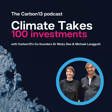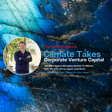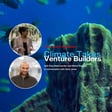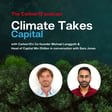Podcast Introduction: Climate Takes by Carbon 13
00:00:12
Speaker
Welcome to Climate Takes, Carbon 13's podcast where we ask our special guests for their takes on their industries and climate challenges, as well as setting a call to action, what is it going to take to fight the climate emergency.
Meet Charlotte Kirk: From PhD to VC
00:00:26
Speaker
On this episode, I'm delighted to be joined by Charlotte Kirk, who will be sharing her journey from PhD to CVC to VC.
The Role of Deep Tech in Climate Investment
00:00:35
Speaker
Climate, a lot of climate is deep tech investment and the importance of VCs who understand this area cannot be understated. So for this episode, climate takes deep tech investors.
00:00:48
Speaker
For a scientist to thrive in venture you capital, you know, certainly my answer for aspiring founders would be to have those grit factors.
Setting Up a $100M Venture Fund: Insights from Charlotte Kirk
00:00:59
Speaker
So I set up our Fort Worth Venture Capital Fund, which was $100 million. Here you really have seconds to grab an investor's attention. You need to have your elevator pitch nailed
Crafting a Compelling Elevator Pitch
00:01:10
Speaker
down. What problem do you solve?
00:01:12
Speaker
How do you do that? Why are you uniquely placed to work? Founders sometimes focus too much on technology and not enough on the commercialization and the scale up.
00:01:23
Speaker
And then as a investors, we need to be more selective about which early stage startups are worth pursuing and then focus on how to best scale the most promising solutions.
Charlotte's Chemistry Background and Its Impact on Climate Tech
00:01:34
Speaker
Charlotte, welcome. Thank you so much for joining us.
00:01:37
Speaker
Sarah, thanks so much for having me. I and really excited for this episode. I knew I had to have you on the podcast because you do have a PhD in chemistry ah from Oxford, I believe. um And so much of the startups that we see in climate tech are IP led, science based or what we would call deep tech or hard tech.
00:01:57
Speaker
and So we need expertise from investors in the problem set and also the solutions. I think that's fair to say. But I think we want to look at your journey to becoming a VC from being a scientist, but also look at how you're applying that skillset as a VC, what you want to see from founders, and also how you view the technical due diligence process of an investment.
00:02:20
Speaker
So that's all coming up. But I think first, Charlotte, small question.
Charlotte's Climate Journey: PhD to Venture Capital
00:02:24
Speaker
and ah Tell us about your journey to being a VC. Yeah, well, thanks again for having me. So I guess my climate journey started when I did my PhD at Oxford, 10 years ago now in hydrogen and ammonia technologies.
00:02:40
Speaker
um And I quickly realised that the best technology means nothing if it doesn't get out the lab and it doesn't commercialise and scale. So I went to work for a strategy consulting in London for a few years, and I led their renewable fuels and products, industrial decarbonisation work,
00:02:55
Speaker
um So that was helping early stage startups on their commercialization strategy, working with corporates on what their innovation roadmap should be, and also working with policymakers on how to develop policies that enable the best technologies to scale and commercialize and make a difference in the world.
00:03:14
Speaker
And it was through some work I was doing for the European Commission um about future trade of of renewable fuels that led me to Fortescue, the fourth largest just iron ore exporter in the world based in Perth in Australia.
00:03:26
Speaker
um And that might seem alien to a lot of people, but you know, you think about iron ore, it's a very heavily emitting sector, but the founder, Dr. Andrew Forrest, is very passionate about um decarbonizing with renewable energy yesterday.
Decarbonization Projects: Energy Storage and Transport
00:03:40
Speaker
um And when you break it down, it's very relatable to the industries we we talk about all the time. So power decarbonization. We're building two gigawatts of generation distribution transmission in the Pilgrim.
00:03:51
Speaker
um A lot of focus on long duration energy storage, how to manage the intermissancy variability, um heavy heavy transport decarbonisation, just that our trucks were massive and funky looking, but um battery electric vehicles, fast charging, fuel cells,
00:04:08
Speaker
ammonia ships, ammonia truckt trains, um and heavy industry decarbonisation as well. Green iron, green steel was a big part of our emissions. And we had a portfolio of hydrogen-based production projects to sell ammonia or potentially even synthetic aviation fuel into um other people to help them decarbonise as well.
Innovating in Maritime: The Ammonia-Powered Ship
00:04:28
Speaker
And so my role as head of technology was to make sure that we had the right technology for our projects, developed it where we didn't. So we built the world's first ammonia powered ship, um which we took to Dubai for COP and had some carry on board. And it's now in London, um which is very exciting. And also that we invested for the next wave of innovation.
00:04:49
Speaker
um So I set up our corporate venture capital fund, which was a hundred million dollars. in seed series A technologies um that enable deep decarbonisation and industrial transformation.
00:05:00
Speaker
And we also invested off of the balance sheet as well. um And I knew that I wanted to get into financial VC sort of really being at the forefront of translating that deep technical knowledge, nerding out with those founders into language that um people who can write those checks, develop those policies, really make a difference can do. um And I think especially at early stage, as technology innovates and scales, it's inextricably linked to the deal itself. And and so The ability to lead deals and have greater flexibility, sort of autonomy in the decision making, not always being tied to a strategic, um is attractive.
00:05:38
Speaker
And so I joined Clean Energy Ventures in September.
Expanding Clean Energy Ventures to Europe and Israel
00:05:41
Speaker
um So it's an American-based venture capital fund. um Initially, it was a group of angels investing in the Boston, Harvard, MIT area.
00:05:50
Speaker
They did very well investing. So raised the first fund with external capital um was $100 million dollars to invest in North America. That funded very well. And so the second fund closed in.
00:06:01
Speaker
last year um and expanded from North America to include Europe and Israel. So I came on as part of that, opened a London office. And so i you know deal source amazing technologies across Europe, managed some of um our investor really ah relationships and co-investor network, um given I've sort of lived in Europe for a long time and know a lot of people here.
00:06:24
Speaker
um And we have two investments here in Europe already, a SAF company in Oxford and an ammonia company in Israel. So that's my journey in a nutshell from, you know, PhD to CVC and VC.
00:06:36
Speaker
Had times in the army at various points, um was a professional athlete for a little bit, but that that's a story for another day. Oh, excuse me. And you found time to be a high performance athlete at the same time. um I think that, you know, really resonates with the carbon 13 world because we literally were conceived to bring together the science knowledge with the commercialization knowledge to scale those technologies. So that's very much the, you know, the the essence of carbon 13 as well.
00:07:10
Speaker
And I think demonstrates just how useful scientists can be to net zero, where it's not just about being in the lab. There's so much that you can offer um in the corporate world and the investment world as well.
00:07:24
Speaker
um So that's been your journey so far. Second difficult question. What's your take on VC this year in 2025?
2025: A Pivotal Year for Climate Tech
00:07:34
Speaker
Because I feel like it's quite an interesting pivotal year.
00:07:39
Speaker
Yeah, I think that it's exciting that the energy transition is is gaining real momentum. Even the most challenging sectors now have a line of sight to decarbonisation. But the paths to get there are unclear.
00:07:53
Speaker
um And there's heightening geopolitical tensions sort of across the world. And so I think that we're at this pivotal moment, like climate tech is at this this this phased new phase where progress and scale up sort of mean that we have to bring together new ideas, new financing, new execution.
00:08:11
Speaker
um you know My background is technology, that's what I love. and And yes, they are there are hurdles in technology development. um But to be honest, that I think ah often a lot of the challenges some of these startups are now facing It's more on financing first-of-a-kind projects, the need for clarifying policy and regulation and sort of shortening infrastructure timelines.
00:08:33
Speaker
And so, you know, it's clear that collaboration is what's needed to just sort of try and overcome those and accelerate the commercialization of those those climate technologies.
Leveraging Industrial Background in Climate Investment
00:08:47
Speaker
Which I think is why your background is so interesting, because I think software VCs would not have been sat here saying we need to worry about direction of policy, shortening infrastructure times, ah etc.
00:09:01
Speaker
Whereas you've had that experience at Fortescue, you know, it doesn't get much more industrial than iron ore mining. music Yes, exactly. And I don't have a B2B SaaS background, which is traditional venture capital. I have come this come at this from um the need to deploy capsule intensive hardware. If we are going to display source fuels with renewable energy, we simply need to build a lot more renewable generation. We need to focus on how to get renewable electrons
00:09:34
Speaker
onto, across and off the grid into the most heavily emitting sectors. And that just means building a lot of stuff. And that takes time. And fossil fuels, unfortunately, are low cost in in many industries.
00:09:53
Speaker
um And so I think what's exciting and what climate tech is going to need to do this year is show sort of dual benefits. And that's very clear. um You know, there's a lot of ah energy security benefits and sort of defense tech um parallels with a lot of climate tech, you know, distributed um generation um enables energy security. A lot of critical minerals, extraction, refining means that you can onshore manufacturers and supply chains, you know,
00:10:23
Speaker
And so sort of rephrasing something as simply being a climate solution into having this primary benefit being something else and the climate being a co-benefit is I think what's what's going to happen. Climate tech itself is not really in vogue, but we're still very clear that these technologies are going to be needed for for deep decarbonisation.
00:10:45
Speaker
It does feel at the moment that you can say, on security, instead of climate tech, energy security, food security, supply chain security, um <unk> cetera.
00:10:58
Speaker
and But, which I think I'm saying, I view it as a maturing of climate tech where we're now actually starting to talk about more of the nitty gritty and how we actually do it.
00:11:10
Speaker
um And it's more meaningful conversations when it is more granular. But also, and I cannot overstate this enough, the, A, the climate emergency is still very much excellent and getting worse every year.
00:11:22
Speaker
The founders that we come see coming through Carbon 13, climate is still one of the most motivating factors for their decision to start a company. which ah we So we still need that momentum of caring about trying to do something to adapt humanity to to the coming climate crisis. And I think it's a personal motivation for founders um we
Founder Mission Fit: Key for Deep Tech Investors
00:11:46
Speaker
can't overstate that. So, you know, I've sat in a room, deep tech investors have said, okay, what do you look for? And, you know, been asked, what do you look for in a team?
00:11:52
Speaker
The founder mission fit is still actually as crucial as ever where you really want committed founders. And those founders in climate are committed because they are trying literally to save the world. and And actually, we do want to see that as deep tech investors, that mission fit is actually crucial.
00:12:08
Speaker
um There was a couple of things you said, but I just want to pick up on. How are you seeing as a VC, are you seeing the exits for climate tech at the moment?
00:12:22
Speaker
Yeah, I mean, I think it's an interesting question um and clearly ah very important one. Successful and exits are obviously integral to venture capital, unlocking that game changing value for for both the the investors, but also the the entrepreneurs and the founders themselves.
00:12:38
Speaker
um you know But for this new wave of climate tech startups developing hardware and physical infrastructure, exit strategies can be less straightforward than typically seen for software companies. you know Companies are often further from profitability, given their sort of capital intensive innovations.
00:12:57
Speaker
They might have to navigate longer timelines, more complex paths to that unicorn valuation. um But also the sector remains relatively new and there's limited successful exits in recent years, like either via M&A or in the public markets, given sort of the broader macroeconomic challenges and like geopolitical issues.
00:13:16
Speaker
And so I think that companies, and what I'm seeing is ah sort of exploring alternative strategies, maybe to remain private longer. um And so they're needing to be more creative about structuring and negotiating for optimal exits, how to strategically plan to realise that long term value creation for everyone, including the planet.
00:13:39
Speaker
um And so it's I think what I'd say to founders is it's really important to proactively plan for that exit from the outset, you know, setting goals, establishing, measuring KPIs that inform the strategy alongside, you know, refining your business model to tell that compelling story.
00:13:59
Speaker
And so like along the journey, fostering strategic relationships with potential acquirers, you can hopefully ensure that ideal exit timing um and sort of align or valuation expectations ultimately to best position your company to drive that maximum result.
Strategic Exit Planning for Climate Startups
00:14:21
Speaker
We have our applications open to our accelerator at the moment, the Venture Launchpad. And what I'm trying to sort of explain... the focus of it, I'm trying to say to founders, we ask you to look up because when you're very early stage, you're looking at the immediate challenges in front of you and our accelerator gives you the chance to look up and say, okay, actually realistic exits for this look like this. And we're going to need to understand the journey to that point.
00:14:47
Speaker
Um, and to talk to people who can, who can say, okay, this could be a potential path. This is ah maybe a five, 10 year path that you're starting. but it's trying to ensure you've got a confident first step down there.
00:14:59
Speaker
um I think that's very important. You also referred to time. And in climate in particular, how how are you seeing the tension between incremental innovation that corporates do well with breakthrough that VCs do well? Why is time in particular important to climate investing?
00:15:23
Speaker
I mean, it sort of comes down to the time value of carbon, right? And the and the short answer is that we need both radical innovation and deployment today. Some sectors do still need more moonshots and like fundamental research.
00:15:38
Speaker
Others need focus on commercialization and deploying the technologies we already have that are mature today. And I think that um founders sometimes focus too much on technology and not enough on the commercialization and the scale up.
00:15:52
Speaker
And then as investors, we need to be more selective about which early stage startups are worth pursuing and then focus on how to best scale the most promising solutions. um And so I think that...
00:16:06
Speaker
the the where corporates come in is that they can play a transformative role in the energy transition. They can help, you know, accelerate the development, deployment of any revolution climate technologies.
00:16:17
Speaker
and They can advance to innovation, drive collaboration, all that that kind of things. They have financial resources, market access, expertise. um And so, but they aren't driven by financial returns and they do, don't have a short timeline. So, um,
00:16:35
Speaker
You know, one example i I often describe is the two projects that we had at Fortescue. One was a green ammonia project. um And green ammonia it actually isn't something new. The concept of taking electrolytic hydrogen and putting into a Harbour-Bosch reactor was first done by Norse Hydra hundreds of years ago.
00:16:54
Speaker
We only stopped doing it because natural gas became so cheap. So the technology exists. Yes, it can be innovated on. to now deal with intermittent renewable resources, but fundamentally it exists.
00:17:06
Speaker
What we need to do is deploy these things at scale. And so, you know, we We applied to the innovation fund and the innovation wasn't per se around the technology. It was bringing them together.
00:17:17
Speaker
The business model, having a long-term PPA, having a long-term contract um and bankable um offtake partners in order to get that project finance around it.
00:17:28
Speaker
um A lot of these markets aren't commodity markets, even ammonia. Today, fossil ammonia, it's a global commodity, but it's not a liquid market. um And so we're having to sort of transition from these commodity markets to these bankable projects in order to get the financing on on board. And Green Seal is a good example of ah doing it well, where they've brought long term offtake locked in before the plant has even produced the steel in order to get you know the credit worthiness that the the bankers and the infrastructure players need.
00:18:01
Speaker
um So innovation can be much more than technology is is what I would say from that. um And in terms of the the deploying today, you know, I mentioned that the so the Green Pioneer, the world's first ammonia powered ship that we built at Fortescue.
Zero-Emission Solutions: The Ammonia-Powered Ship
00:18:16
Speaker
We did that in four months. We retrofitted an existing ship, um two or four four-stroke engines to run dual fuel, ammonia and and biodiesel. um So at the point of, the ah you know, at the tailpipe, if you will, that is a zero emission, zero, net zero ship.
00:18:34
Speaker
um And we did that in four months, like I said. um We didn't, yes, MANA developing, Water Slur, WindGD, engine developers are building new, hopefully, know,
00:18:47
Speaker
zero emission engines, but we have an existing fleet, be it in marine, be it in aviation. We just have a lot of existing infrastructure we we can't ignore. And there are solutions today that we can work with what we've got.
00:19:01
Speaker
and And like I say, that time value of carbon means that um a ton of CO2 that we can evade today has much more impact than ton in the future. And so I think as As investors, operators, founders, as humans in the world, you have to hold two things true in your brain.
00:19:17
Speaker
One is um what can we do today that can make a meaningful impact um that is often not the most innovative, not risky technology because you need that project finance behind it, but simultaneously what can you invest in the next wave of innovation that can be potentially swapped in in the future or deployed at scale in the future that might be more of that breakthrough solution.
00:19:42
Speaker
And this is why I think your background as an investor for deep tech is so interesting because you have actually been there and done that. You've not done your own startup, but you have done from the beginning really complicated infrastructure projects and got them off the ground.
00:19:59
Speaker
And you've you've seen those commercialization challenges up front and just how that's just so unique and complex to each project. um And you' you've seen that basically.
00:20:14
Speaker
So i think ah when we look at, okay, looking at startup you're looking at a startup and you're bringing your background to should we be bringing this startup to investment committee or even should I be having a second call with these guys?
00:20:32
Speaker
Can you please give me a basic 101 on what a technical due diligence process looks like? What are you looking for in an initial conversation? Then also when things are getting really serious, you're all ready to sign the term sheets and you're doing you're doing the the final due diligence checks. What does that look like?
Technical Due Diligence in VC Investments
00:20:51
Speaker
Okay, so as the 101, I guess, you know what is diligence? It's that that rigorous evaluation that determines whether the venture capital fund or the investor will invest in that company.
00:21:02
Speaker
and And so who does it? It's firstly the the deal deal team within the VC firm. um And then internally, you have an investment committee. So the the general partners or the people with the fiduciary responsibility um who will have to sort of sign off on the decision.
00:21:19
Speaker
um And then sometimes you might consult with external experts or consultants if there's sort of specific areas. So it's those parties working together. um And then how does it work? That's the big question. um And one thing I've certainly learned is that everybody does it differently.
00:21:36
Speaker
And the process can also look differently within a fund for different deals. um But in general, you know, it starts with the screening stage, um initial review of what the opportunity chi is, a quick assessment of the pitch deck, a call with the team.
00:21:51
Speaker
And here you really have seconds to grab an investor's attention. You need to have your elevator pitch nailed down. you know What problem do you solve? How do you do that? Why are you uniquely placed to win?
00:22:04
Speaker
And the aim at that point is simply to get to the next stage, the next call. um And so, you know, once you've got a VC's interest and you've made it to that next stage, they'll start to do that in-depth analysis. And there's certain buckets of things that that I'll analyze in detail, not necessarily in this order.
00:22:22
Speaker
But, you know, firstly, the commercials. What's the market opportunity? What are the market drivers, the challenges, the trends, the size? We talk about the TAM and the SAM and the SOM. um You know, what share of the market can they realistically bit get? What is the size of the opportunity?
00:22:39
Speaker
um Then the technology and sort of the product itself. how How does the company solve the problem? What product are they offering? Yes, the core technology.
00:22:50
Speaker
How does it work? What are the challenges there? but But also on the manufacturing and the supply chain for that scale up. um It'll probably include a review of the IP and the strategy for that, um as well as sort of a DD on any projects where that technology is being used, be it ongoing or in the future.
00:23:08
Speaker
um It might include at this stage sort of a competitor analysis. um Who else is on the market? Why is this company uniquely placed to win? um And then there's the business model. um you know How does the company currently make money or how do they plan to make money?
00:23:26
Speaker
um Depending on the size of the company, you might include a revenue model, a pricing model, sort of a sales strategy. um You'd certainly look at their traction to date and sort of their traction towards commercialization, um you know, binding offtake agreements, customer traction, analysis of those customers, what purchase orders do they have, what what revenue, know, really what demonstrable willingness to pay is there for what they offer.
00:23:53
Speaker
And I think, and then team, um you know, is crucial to the success of a company. um And so we'll look at the founders and the management team, you know, how is their experience relevant to their roles in the company?
00:24:05
Speaker
How do they build and foster a team dynamic? What is their hiring plan? Like, why is at the end of the day, you really honestly invest, especially early stage in the team. And so how is that team set up for success?
00:24:17
Speaker
um The other things that are really important are obviously like legal, financial and tax. the extent to which you do DD on these things. looks very different on the size of the check, the stage of the deal, what your role in the syndicate is, and that there very well might be experts you outsource that to as well.
00:24:35
Speaker
um And as a VC, you're you're doing all of this to go into an investment memo that will be presented to your investment committee. um And so the the final sort of very important part um is the deal itself.
00:24:50
Speaker
You know, a great team can have amazing technology. But venture capital is one specific type of funding that in most cases role is to return money to its limited partners with those outsized returns.
00:25:02
Speaker
So the key questions that I think have any asked, are what is the deal? How much are you going to invest for what percentage of equity stake? You know, what is the pre money valuation of the company? What the valuation scenarios?
00:25:15
Speaker
The key assumptions that have gone into that. what What are the proposed terms of the deal, milestones for the raise? um And then you know perhaps most importantly for VCs, what are the exit plans and and return potential?
00:25:30
Speaker
Who will buy the company? What milestones does the company need to hit to get there? How much will each of those milestones cost? What runway will they need to get there?
00:25:42
Speaker
um and so ah what At what price can you expect that 10x return?
00:25:51
Speaker
Because what you've articulated is really a startup founding team is building two products. One is the actual product, but then the company itself is a product. And VCs are trying to sell this product for a higher price than what they bought it for at the end of the
Startups: Products and Companies for VCs
00:26:08
Speaker
day. um And I think if you're trying to construct a pitch,
00:26:12
Speaker
two VCs, you need to understand above all else, that is how a VC will be looking at your startup. um IP, let's go into that. um What are some green and red flags when when looking at IP?
00:26:27
Speaker
and Anything from, yeah, patents or like what, or yeah, or even, okay, it's not formally patented, but you're like, okay, that looks like it's going to be sufficient to be defensible or,
00:26:41
Speaker
I think that certainly for that when you're looking at sort of pitfalls for D&D for certain founders, one of the big things would say is, especially in deep tech and hard tech, is don't have IP issues.
00:26:52
Speaker
Make sure it's all registered and filed properly. um Make sure you own the IP. um And I'd say just you know be communicative and transparent. Don't hide anything.
00:27:04
Speaker
I think that you know failing to acknowledge any pet potato potential weaknesses or risks can damage trust. And that's ultimately what you're trying to build at the end of the day. So you know be upfront.
00:27:17
Speaker
These investors are going to be with you for the long term and they are your partner and in many ways. um And so... you know, when it comes to IP or anything else, be prepared, have a good data room, have it with clear sections, have it sort of ideally mapped into those buckets I described above.
00:27:40
Speaker
Don't have any sort of disorganized or conflicting data, um but do recognize that a lot of Hard tech and deep tech VCs you know invest um based on that IP mode or based on um you know that defensibility.
00:27:57
Speaker
um And so IP will be a big part of that of many VC funds' diligence process.
00:28:06
Speaker
Okay, interesting. And again, a slight difference to what you might have heard with, say, out-and-out software VC. I mean, look, they're looking for defensibility as well, but it's not going to be IP-based.
00:28:17
Speaker
I think when people hear due diligence, they they probably think, okay, yes, the tech works, etc, etc. I don't think founders realise just how much due diligence is done on the team. um At Carbon13, as I said earlier in the podcast, we're trying to put scientists and developers together with commercial brains.
00:28:35
Speaker
how How do you view an ideal deep tech team? But also, what would due diligence on the team look like? Yeah, I mean, I think venture capital at the end of the day is all about the team.
00:28:48
Speaker
The technology obviously has to work. The market pull has to be there. But out of all of the five Ts, team timing, tech traction, team performance,
00:29:00
Speaker
what ah comes first in most stages, especially at early stage. So I think my advice to to founders, you know, if you if you're like me and you have a PhD in a relevant subject or a scientist, you come from an engineering background, you have those deeply quantitative analytic skills.
00:29:16
Speaker
Tick. that obviously has to be there. But for a scientist to thrive in venture capital, you know certainly my answer for aspiring founders would be to have those grit factors.
00:29:30
Speaker
Honestly, um a lot of sort of what I learned from my days in the infantry in the army. um i was actually talking about this with the Regen team back in Australia recently And they describe it as the dog mentality, which is a term they've taken from the NBA and basketball.
00:29:45
Speaker
But basically, it means having that relentless drive and like unwavering dedication to achieving success. That's what building a startup takes. And I think that resilience is key, you know that the ability to stay focused and driven.
00:30:00
Speaker
even in a challenging situation, which will come, and adaptability, you will pivot multiple times. the The technology on your own seed deck is not what will IPO.
00:30:12
Speaker
um And you'll have to pivot through choice and through force and What's crucial is maintaining that team cohesion throughout. Being a CEO means being a leader, not a manager.
00:30:25
Speaker
And you have to inspire every team member to support each other to want and to achieve that shared goal. And I think that how you diligence that is um hard, especially for people who are very quantitative in nature.
00:30:43
Speaker
It's very... it's relatively easy to understand the second law of thermodynamics and if a technology could or could not work um from a physics and chemistry basis but understanding how a team how individuals in a team operate and how they fit together is non-linear and um often a gut sense and I don't have a good answer for um how to diligence it and I think it's also true that you know the best team will have to iterate over time um it's rare that there are rock star CEOs who are both technically minded at early stage and commercially minded for
00:31:28
Speaker
the IPO and late stage, but, but they do exist. Um, and so I personally like to spend time with the team in the office, see how they, um In the army, I used to describe it as see how they operate when no one's watching, you know, when, um how do they treat other people around them? What is the culture in the office? How do they act at dinner in the evening?
00:31:52
Speaker
What did they do on the weekend? um Because that is the true essence of who someone really is. and when things go wrong, when times get tough, that is the individual that will come
Aligning Values in Investor-Founder Partnerships
00:32:03
Speaker
Like that that's the true character that can't be masked. And ultimately that is is is who you're dealing with. and And so understanding that, um and like I said before, I think an investor found a partnership is is hopefully for the long term. And so think spending time and understanding that your values, your principles, your vision is aligned, is crucial. And I'd say that as much as the investor should do that on the founder, the founder should do that on the investor as well, because, um you know, you are giving some equity to that investor. And I think that
00:32:39
Speaker
it is important to to find investors that not only provide capital, but also whose values sort of align with your long-term vision. So yes, as a founder, deed do your DDO and your investors track record their reputation?
00:32:54
Speaker
i'd say the individual that you're planning to bring on ah more so than, or like as much as the firm, is it, are they a good cultural fit? You know, what are their value add capabilities?
00:33:04
Speaker
um How do they operate? You know, if you are that rockstar team, With incredible technology and this massive market pull, you won't shouldn't struggle to find investors.
00:33:16
Speaker
And so don't settle on um the wrong one because hopefully it will be that partnership. And I think it is a plus-sum game and and the right team with the right investor can have that massive impact for the planet as much as everyone else.
Military Lessons for Venture Capital
00:33:30
Speaker
I think there's a lot we can learn from the army recruitment process in those that context, which is they really do, you have, they spend time with you. but I believe um you will go to, ah ah you know, army dinners and things like that because they want to get to know you as a person and because they know that what you're about to embark on is incredibly challenging. It's not about whether or not they like you.
00:33:53
Speaker
It's about whether or not they think this is the best choice for you because they're they're able to pattern match that having seen having seen it before. And again, it's a vital part of Carbon 13's approach to investment as well.
00:34:04
Speaker
Through our programs, we'll have worked with these founders for six months before we're investing in them. um So we're able to see, okay, how is the team working together? Do we think they're aligned?
00:34:16
Speaker
um ah It's not even just on the skill set, as I say, it's like, do we think they actually want the same thing? If I'm talking to two founders of the same company separately, and they're both telling me very different things about the future of the company.
00:34:30
Speaker
um It suggests that they're not aligned and it's very difficult to overcome that ah tension. This is a you know, raising investment is a really serious contract to go into.
00:34:41
Speaker
And if you wouldn't work with those people, why would you go into a contract with them? And it does it does go both both ways, as you say. um And I think also as well, um If you're a team, often deep tech founders, the team might be slightly larger.
00:34:56
Speaker
You probably see that too, Charlotte. So even at pre-seed, we might see four founders or so And
00:35:05
Speaker
it may be that, you know, one of you is leading the engagement with the investor, but the investor will need to spend time with the other three founders or or whatever at the same time.
00:35:17
Speaker
and understand what they bring to the table as well. I saw a VC um say, look, it was a red flag. I was annoyed. um I just discovered I was about to kind of make an investment. I just discovered the CTO isn't full time on this company.
00:35:33
Speaker
And her point was not um that the CTO had to be full time before taking that investment because the investment was what was going to enable them to go full time. The point was they were kind of deliberately obscuring that fact.
00:35:48
Speaker
And it's the transparency, which you mentioned earlier. um VCs like to see that transparency because then they can help you with the problem and build trust um over that as well.
00:36:01
Speaker
um Any other red flags with with with a team? you know If you've got four founders and one founder has significant equity and they're not really involved and they're kind of becoming ghost equity, that can be a red flag for an investor as well.
00:36:14
Speaker
um So for for deep tech teams, be Be sure that you're looking at your shareholder agreements for vesting periods, time level of commitment. um It's terrifying, Charlotte, isn't it? How many startups, really exciting startups are failing at a seed and say stage and beyond because of something as simple as debt equity?
00:36:34
Speaker
ah Yeah. cry that um not there are no sort of often there are no hard lines and you know with the right creativity and people who are genuinely passionate around the table often there are solutions so obviously it's best to have everything done properly in the first place um and have a you robust strategy on how to sort of grow and scale but we all make mistakes and we all are learning as we muddle through these things and so
00:37:10
Speaker
if you are a founder listening and you think you haven't done something right or you think that something could be done better, you know, be creative about ways to get there. Talk to people who could help you understand different pathways or different challenges.
00:37:23
Speaker
You know, hard tech, climate tech investing is different to B2B SaaS. in And so... like I said, there hasn't been this plethora of exits for us to draw from.
00:37:36
Speaker
There isn't this well-trodden pathway of how things should be done. um And so and I think that because it is an industry where people are still more, um,
00:37:48
Speaker
value aligned and principle aligned, there is that passion to find a solution for the right um problems in perhaps that there isn't a way in different industries. So I see it as from a positive lens of how can we fix this?
00:38:04
Speaker
um And if if it's something you really believe in and finding the people to do it with.
00:38:12
Speaker
ah And final question, Charlotte, when you get to your laptop at 9am in the morning and you see your to-do list or your diary, what what makes you, mo what what thing are you going to be most excited about in your day?
Collaborative Efforts in Tackling Climate Challenges
00:38:29
Speaker
I think what I'm most excited about is the collaboration that solving this climate challenge will require.
00:38:40
Speaker
you know We need collaboration across investors, across financing, scaling climate tech needs, um different frameworks that lower the risk, attract the capital.
00:38:52
Speaker
And so you need to, there's a shift from early stage VC to later stage growth, private equity, infrastructure players. How do you bring together different types of funding?
00:39:04
Speaker
be it catalytic capital, family offices, venture debt, corporate equity, project finance. um How do you really help these technology startups transition from that lab stage demonstration to commercial deployment?
00:39:20
Speaker
And I think that you know what what we're learning and seeing is these as these technologies are de-risked, the focus is moving towards these business model innovations, how to get these investable unit economics, how to tell this compelling story um to address the funding gaps.
00:39:38
Speaker
You know, it's the classic infrastructure returns at venture level risk conundrum. And so we need that collaboration across the value chain. How do we get those bankable offtake agreements that ah that are so key to attracting capital, de-risking investments and provide that demand and sort of techno commercial viability, especially where there's no you know liquid global market,
00:40:04
Speaker
um You know, it's even collaborated with governments. They they play a public a key role in public procurement and sort of enabling the policies required. know, we've just had the Clean and Industrial Deal announced in Europe last week. But um governments can also do sort of long-term partnerships and and sort of projects, really, to extend the sort of
00:40:28
Speaker
lifetime of these these projects in terms of their revenue and financing. um And so I think that it's that collaboration and and working with like-minded individuals that that I enjoy so much in the day-to-day life, be it founders, investors, operators, policymakers.
00:40:47
Speaker
ah you know I think working together to achieve that common goal is is fun.
00:40:54
Speaker
i can see that I can see that you love learning. i think that's if that's anything from your science background, it's being a VC is you're you're learning something every day. And I think that's just fantastic.
00:41:07
Speaker
um So um ah thank you very much, Charlotte. um And to our listeners, um you please do check out our other podcasts, which also speak to some of the themes that Charlotte's just referenced as well.
00:41:21
Speaker
um and I think when we look back on this episode and we're asking ah What is climate going to take? I think it's going to take ah deep tech investors. It's going to take investors with science backgrounds.
00:41:33
Speaker
It's going to take due diligence on tech, on market, on team. And it's going to take collaboration. Thank you very much for joining. Climate takes deep tech investors.











